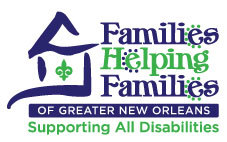
The Office for Citizens with Developmental Disabilities (OCDD) is responsible for providing services and supports to individuals with developmental disabilities in Louisiana.
What is a Developmental Disability?
According to statute reference – LA R.S. 28:451.2 “Developmental Disability” means either:
a.) A severe, chronic disability of an individual that:
i. Is attributable to an intellectual or physical impairment or combination of intellectual and physical impairments.
ii. Is manifested before the individual reaches age 22.
iii. Is likely to continue indefinitely.
iv. Results in substantial functional limitations in three (3) or more of the following areas of major life activity:
aa) Self-care.
bb) Receptive and expressive language.
cc) Learning.
dd) Mobility.
ee) Self-direction.
ff) Capacity for independent living.
gg) Economic self-sufficiency.
v. Is not attributed solely to mental illness.
vi. Reflects the person’s need for a combination and sequence of special, interdisciplinary, or generic care, treatment, or other services which are lifelong or extended duration and are individually planned and coordinated.
b.) A substantial developmental delay or specific congenital or acquired condition in a person from birth through age 9, which without services or support, has a high probability of resulting in those criteria in Subparagraph (a) of this paragraph later in life that may be considered to be a developmental disability.
Developmental Disability Services Provided through OCDD
Louisiana’s Early Intervention Program, EarlySteps, provides services to families with infants and toddlers ages birth to three years (36 months) who have a developmental delay or a medical condition likely to result in a developmental delay. Children with delays in cognitive, motor, vision, hearing, communication, social-emotional or adaptive development may be eligible for services. EarlySteps services are designed to improve the family’s capacity to enhance their child’s development. These services are provided in the child’s natural environment, such as the child’s home, child care, or any other community setting typical for children ages birth to 3 years (36 months).
OCDD provides monthly stipends to families of eligible children with severe or profound developmental disabilities from birth to age 18 to help their families meet extraordinary costs. These subsidies are offered on a first-come, first-served basis. To submit an application, contact your local human services district or authority.
Medicaid home and community-based waiver programs allow people greater flexibility to choose where they want to live and to use services and supports that best suit their needs. Services are provided must represent a least-restrictive treatment alternative. Each home and community-based waiver has specific service packages and eligibility requirements. Waiver opportunities are dependent upon funding, and are also offered based on the individual’s need and priority level from their Screening for Urgency of Need (SUN) through the Request for Services Registry.
Click here, to get detailed information about OCDD’s home and community-based waiver services or click the links below to learn more about each waiver offered by OCDD.
Children’s Choice Waiver (CC)
New Opportunities Waiver (NOW)
Residential Options Waiver (ROW)
Supports Waiver (SW)
Self Direction: For more info please click here.
To apply for waiver services, contact you local human services district or authority.
OCDD’s four developmental disability home and community-based waivers, New Opportunities Waiver (NOW), Residential Options Waiver (ROW), Supports Waiver, and Children’s Choice Waiver have now been operationalized to a tiered waiver system of service delivery, which will allow for individuals to be supported in the most appropriate waiver. To learn more, click here.
Individual and family support services provide assistance not available from any other resource that will allow people with developmental disabilities to live in their own homes or with their families in their own community. These services include respite care, personal assistance services, specialized clothing, dental and medical services, equipment and supplies, communication services, crisis intervention, specialized utility costs, specialized nutrition, and family education. Services are provided through contractual agreements by private provider agencies or through individualized agreements with individuals and families who obtain their own service providers.
To apply for Individual and Family Support, contact your local human services district or authority.
My Place Louisiana is the state’s program for the federal Centers for Medicare and Medicaid Services Money Follows the Person (MFP) Rebalancing Demonstration, designed to help states try new ways of delivering Medicaid services. The demonstration program is designed to help people to move or “transition” from an institution into home- and community-based living settings, such as a home or apartment. To learn more about My Place Louisiana, click here.
The OCDD Resource Center provides techical assistance and consultation to build provider capacity to support individuals with DD to live and work in community settings as well as direct, specialized treatment for persons in the community with developmental disabilities in the most critical situations. Though collaboration with both families and providers, the Resource Center services are designed to assist individuals to remain in a community living environment and migrate placement in more restrictive and potentially more costly institutional placement. To learn more about the Resource Centers, click here.
Support Coordination (formerly case management) is defined as services provided to Medicaid Eligible recipients to assist them in gaining access to the full range of needed services including medical, social, educational and other support services within OCDD. To learn more about the Support Coordination, click here.
Medicaid – Disability Benefits
Medicaid provides medical benefits to low-income individuals and families. Although the federal government establishes the general rules for Medicaid, specific requirements are established by each state. In Louisiana, over a million residents receive health care coverage through Medicaid, most of whom are children under 19. The Louisiana Medicaid Program operates within the Louisiana Department of Health.
Do I qualify for Medicaid?
Medicaid eligibility is determined using the Federal Poverty Level income guidelines. Visit the Monthly Income Limits for Medicaid Programs page.
In Louisiana, you qualify to receive Medicaid if you:
- Receive Supplemental Security Income (SSI) from the Social Security Administration (SSA)
- Get financial help from the Office of Family Support (OFS) through the Family Independence Temporary Assistance Program (FITAP)
You may also qualify for Medicaid coverage if you:
- Are disabled according to the Social Security Administration’s definition
- Have corrected vision no better than 20/200
- Are a low-income parent of children under age 19
- Are a child under age 19
- Are pregnant
- Have no insurance and need treatment for breast and/or cervical cancer
- Receive Medicare coverage and are low-income, or
- Are aged 19 to 64 years old, have a household income less than 138% of the federal poverty level, doesn’t already qualify for Medicaid or Medicare, and meet citizenship requirement
Programs
- Act 421-Children’s Medicaid Option/TEFRA
- Adult Group
- LaCHIP
- LaCHIP Affordable Plan
- LaHIPP
- LaMOMS
- Long Term Care
- Medicaid Pharmacy Benefits Management (PBM)
- Medicaid Purchase Plan
- Medicare Savings Program
For Children and Families
Medicaid administers several programs that provide various health care coverage services to children and families who meet certain eligibility qualifications.
Social Security – Benefits for People with Disabilities
The Social Security and Supplemental Security Income disability programs are the largest of several Federal programs that provide assistance to people with disabilities. While these two programs are different in many ways, both are administered by the Social Security Administration and only individuals who have a disability and meet medical criteria may qualify for benefits under either program.
Social Security Disability Insurance The SSDI program pays benefits to you and certain family members if you are “insured.” This means that you worked long enough – and recently enough – and paid Social Security taxes on your earnings. The SSI program pays benefits to adults and children who meet the requirements for a qualifying disability and have limited income and resources.
Supplemental Security Income pays benefits based on financial need.
Supplemental Security Income (SSI) is a Federal income supplement program funded by general tax revenues (not Social Security taxes):
- It is designed to help aged, blind, and disabled people, who have little or no income; and
- It provides cash to meet basic needs for food, clothing, and shelter.
More Resources
What the Heck is a Waiver?
A printable pdf that explains the waiver from a parent’s perspective.
Developmental Disabilities Service Directory
The Office for Citizens with Developmental Disabilities provides supports and services through a variety of locations throughout the state to support the dignity, quality of life and security in the everyday lives of people with developmental disabilities and their families, acting as the Single Point of Entry.
Source: OCDD
Freedom of Choice Provider Listing
This is the process whereby OCDD assures that each person and/or their family has the right to choose the service provider most qualified to meet their needs. It is important to learn as much as possible about a prospective provider in order to make an informed decision regarding which agency will be best suited to meet you or your family member’s needs.
Source: OCDD
Medicaid Diaper Program
The Medicaid Diaper Program provides diapers and/or pull-ups for individuals between the ages of 4 – 20 years old, with an appropriate referral from your physician. Click on the link to access instructions.
Source: Medicaid
Benefits For Children With Disabilities
Source: Social Security Administration
Sources:
Office for Citizens with Developmental Disabilities (OCDD), Medicaid, and Social Security Administration
